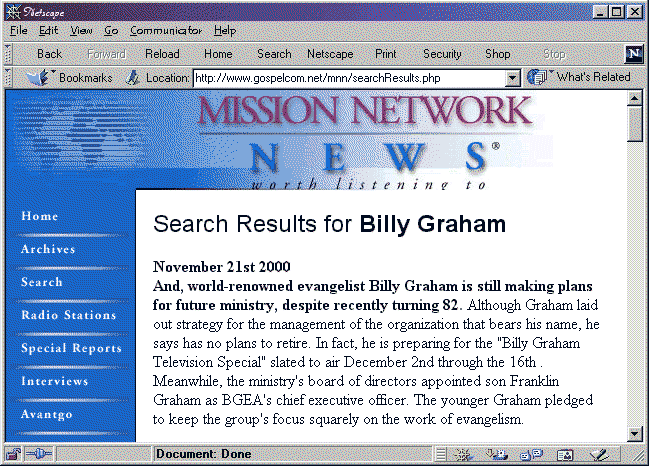|
By DAVID FIRESTONE
The New York Times
Sunday, March 17, 2002
It seemed impossible, when H. R. Haldeman's White House diaries came out in 1994, that the Rev. Billy
Graham could once have joined with President Richard M. Nixon in discussing the "total Jewish
domination of the media." Could Mr. Graham, the great American evangelist, really have said the nation's
problem lies with "satanic Jews," as Mr. Nixon's aide recorded?
Mr. Graham's sterling reputation as a healer and bridge-builder was so at odds with Mr. Haldeman's account
that Jewish groups paid little attention, especially because he denied the remarks so strongly.
"Those are not my words," Mr. Graham said in a public statement in May 1994. "I have never talked publicly
or privately about the Jewish people, including conversations with President Nixon, except in the most
positive terms."
That was the end of the story, it seemed, until two weeks ago, when the tape of that 1972 conversation in the
Oval Office was made public by the National Archives. Three decades after it was recorded, the North
Carolina preacher's famous drawl is tinny but unmistakable on the tape, denigrating Jews in terms far stronger
than the diary accounts.
"They're the ones putting out the pornographic stuff," Mr. Graham said on the tape, after agreeing with Mr.
Nixon that left-wing Jews dominate the news media. The Jewish "stranglehold has got to be broken or the
country's going down the drain," he continued, suggesting that if Mr. Nixon were re-elected, "then we might
be able to do something."
Finally, Mr. Graham said that Jews did not know his true feelings about them.
"I go and I keep friends with Mr. Rosenthal at The New York Times and
people of that sort, you know," he told Mr. Nixon, referring to A. M.
Rosenthal, then the newspaper's executive editor. "And all — I mean, not all
the Jews, but a lot of the Jews are great friends of mine, they swarm around
me and are friendly to me because they know that I'm friendly with Israel.
But they don't know how I really feel about what they are doing to this
country. And I have no power, no way to handle them, but I would stand up
if under proper circumstances."
Mr. Graham, who is now 83 and in poor health, quickly issued a four-
sentence apology, but he did not acknowledge making the statements and
said he had no memory of the conversation, which took place after a prayer
breakfast on Feb. 1, 1972.
| |
